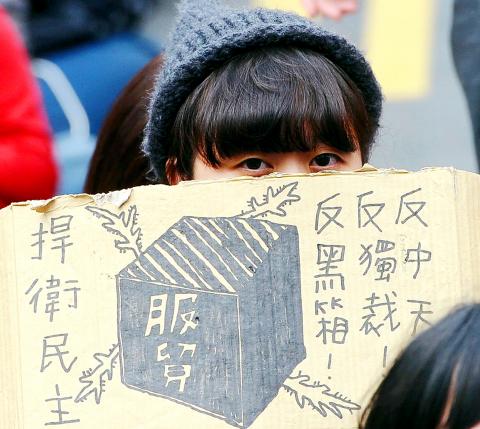The mobilization of tens of thousands against the cross-strait service trade agreement is “a grave” national matter that President Ma Ying-jeou (馬英九) must face by holding a dialogue with the protesters to find a solution, former president Lee Teng-hui (李登輝) said yesterday.
Lee called on Ma to sit down with the student-led activists, who yesterday entered the fifth day of their occupation of the Legislative Yuan in Taipei, to listen to what they have to say about the pact and understand what they want the government to do so they can end the protest and go home as soon as possible.
“This is a grave matter for the country and the president needs to take it seriously,” Lee said.

Photo: Wang Min-wei, Taipei Times
Lee made the remarks in response to media inquiries about the Chinese Nationalist Party (KMT) on Monday sending the controversial pact to a plenary session even though it has not completed the committee-level stage of the review process.
The former president told reporters yesterday that he would have handled the protest movement differently than Ma has if he were still in charge.
During the Wild Lily (野百合學運) student movement in 1991 that culminated in legislative reforms, Lee met with the then-protest leaders on March 21 to listen to their views about political reform.
“People should not call the young people taking part in the pact protest ‘mobsters’ because they are voicing their views and they care about the country’s future,” Lee said.
He added that Legislative Speaker Wang Jin-pyng (王金平) had done the right thing by not attending a meeting on Friday that Ma called by evoking Article 44 of the Constitution to discuss the issue with Wang and Premier Jiang Yi-huah (江宜樺).
“Ma was trying to shirk his responsibility to resolve the issue by passing it on to Wang,” Lee said.
Earlier yesterday, the Presidential Office said in a statement that Ma would not accept the protesters’ demand that he engage with them in a talk about the service trade pact.
The statement said Ma has always been willing to talk to groups representing all interests in a peaceful, rational manner, but that he found the students forcefully occupying the legislative chamber and then using the sit-in as leverage to demand a talk with the president to be unacceptable.
Ma had been scheduled to visit a business in Greater Tainan yesterday, as well as attend an annual event held by civic group Life Line International, but the appointments were canceled and he made no public appearances yesterday.

The US government has signed defense cooperation agreements with Japan and the Philippines to boost the deterrence capabilities of countries in the first island chain, a report by the National Security Bureau (NSB) showed. The main countries on the first island chain include the two nations and Taiwan. The bureau is to present the report at a meeting of the legislature’s Foreign Affairs and National Defense Committee tomorrow. The US military has deployed Typhon missile systems to Japan’s Yamaguchi Prefecture and Zambales province in the Philippines during their joint military exercises. It has also installed NMESIS anti-ship systems in Japan’s Okinawa

‘WIN-WIN’: The Philippines, and central and eastern European countries are important potential drone cooperation partners, Minister of Foreign Affairs Lin Chia-lung said Minister of Foreign Affairs Lin Chia-lung (林佳龍) in an interview published yesterday confirmed that there are joint ventures between Taiwan and Poland in the drone industry. Lin made the remark in an exclusive interview with the Chinese-language Liberty Times (the Taipei Times’ sister paper). The government-backed Taiwan Excellence Drone International Business Opportunities Alliance and the Polish Chamber of Unmanned Systems on Wednesday last week signed a memorandum of understanding in Poland to develop a “non-China” supply chain for drones and work together on key technologies. Asked if Taiwan prioritized Poland among central and eastern European countries in drone collaboration, Lin

TRAGEDY STRIKES TAIPEI: The suspect died after falling off a building after he threw smoke grenades into Taipei Main Station and went on a killing spree in Zhongshan A 27-year-old suspect allegedly threw smoke grenades in Taipei Main Station and then proceeded to Zhongshan MRT Station in a random killing spree that resulted in the death of the suspect and two other civilians, and seven injured, including one in critical condition, as of press time last night. The suspect, identified as a man surnamed Chang Wen (張文), allegedly began the attack at Taipei Main Station, the Taipei Fire Department said, adding that it received a report at 5:24pm that smoke grenades had been thrown in the station. One man in his 50s was rushed to hospital after a cardiac arrest

ON ALERT: Taiwan’s partners would issue warnings if China attempted to use Interpol to target Taiwanese, and the global body has mechanisms to prevent it, an official said China has stationed two to four people specializing in Taiwan affairs at its embassies in several democratic countries to monitor and harass Taiwanese, actions that the host nations would not tolerate, National Security Bureau (NSB) Director-General Tsai Ming-yen (蔡明彥) said yesterday. Tsai made the comments at a meeting of the legislature’s Foreign Affairs and National Defense Committee, which asked him and Minister of National Defense Wellington Koo (顧立雄) to report on potential conflicts in the Taiwan Strait and military preparedness. Democratic Progressive Party (DPP) Legislator Michelle Lin (林楚茵) expressed concern that Beijing has posted personnel from China’s Taiwan Affairs Office to its